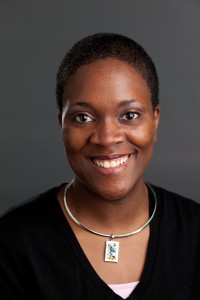Evelmyn Ivens works at the Christian Community Development Association (CCDA) in Chicago and graduated from North Park Theological Seminary in 2013 with a MA in Theological Studies. Evelmyn was born in Mexico and moved to the United States during her teenage years; she has lived in Los Angeles, CA, Washington, DC, and Chicago, IL. Enjoys traveling and learning about other cultures. She’s passionate about issues of immigration, hunger, poverty, and human trafficking.
A couple of weeks ago I was on a panel and I’ve known for a while that the other three participants were men, however, it really didn’t hit until the night before. As I was preparing and reviewing notes I also started to think what would I wear? A thought that may seem superficial, yet, for women even these details are part of a process. I was going to be in front of an audience with two pastors and an executive director. I needed to look casual but not too casual, not too overdressed but neither underdressed, just enough jewelry and what kind of jewelry? Would I wear heels or not? Clothes, shoes, jewelry, accessories, etc. they all make a statement, and off course I wanted to make a statement. I wanted to look as someone who knew about the topic. I in fact know a whole lot about the topic to be presented at the panel; yet, we live in a society where women have to present themselves in a certain way to be respected and to be taken seriously. Sometimes even age is a factor, about two years ago I was teaching a class and on the first day of class, one of the students said to me, “Oh, we thought our professor would be an older woman.” It took weeks before the students, who were older than me would believe what I said, or that I in fact had the credentials to be teaching that class.
The most sexism I have experienced has happened in church and in Christian organizations, sad isn’t? I’ve seen male Christian leaders feel intimidated by highly educated women, they just don’t know how to interact around these women. I have felt so frustrated in situations like this because church and Christian organizations are supposed to be this safe place for women in leadership; however, sometimes it becomes a hostile place.
Then in those moments of frustration I read stories like Sor Juana Inés de la Cruz’s story. One of the best-known Mexican writers, poets, and philosopher. Juana de Abasaje was born in central Mexico in 1648, and according to Mexican author Carlos Fuentes; she was probably an illegitimate child. When she was seven years old, she asked her mother to let her dress as a boy so that she could attend the university. She made her way to the university and there she impressed her professors, Juana was an intellectual who seemed to know everything, even though she faced many restrictions in both the political and religious settings. Juana decided to become a nun, in the hopes to find refuge and autonomy to write. It is then that she becomes Sor Juana Inés de la Cruz. In her cell at the San Jerónimo convent in Mexico City, Sor Juana collected more than 4,000 volumes. There she could write in freedom, with discipline and wisdom. At the end even her cell couldn’t protect her from male dominant and orthodox authority, at the hands of the Archbishop of Mexico, Aguiar y Seixas. At 40 years of age Sor Juana was banned from her library, and was silenced for speaking up her mind. She died in 1695 at 47; however, her work defeated those who silenced her. Sor Juana’s baroque poetry transcended time, and today she is known as a foundational figure of feminism in the Americas.
Figures like Sor Juana, give me hope, also gives me hope male friends who continue to advocate for me, and for other women in ministry and in leadership.
I pray that in those moments of frustration, we can find peace and comfort. Amen.


